Arctic Ground Squirrel Hibernation
Lots to Learn
Wow. I am learning so much at the PolarTREC Orientation and Share Fair. Much of it is about how to use the technology and load information to the PolarTREC website so that we can tell the stories behind the science. Yesterday afternoon we took a field trip to the Museum of the North and enjoyed a presentation by PolarTREC researcher Jeanette Moore of the University of Alaska, Fairbanks on arctic ground squirrel hibernation. She hosted a teacher, Alicia Gillean last year and Andre Wille from our group will join her this year at Toolik Field Station in north Alaska.
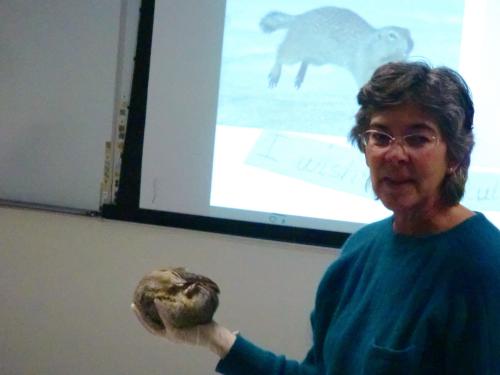 Jeanette Moore of the University of Alaska, Fairbanks tells us about the amazing abilities of these remarkable squirrels.
Jeanette Moore of the University of Alaska, Fairbanks tells us about the amazing abilities of these remarkable squirrels.
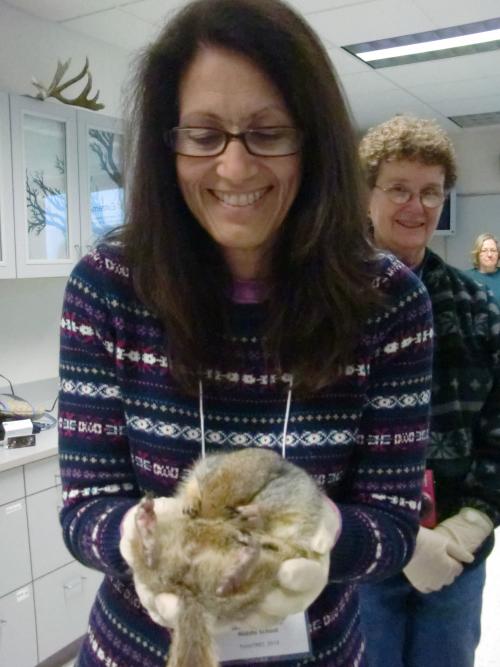 The squirrel was so cute! He was making a few movements while I held him. Waking up?
The squirrel was so cute! He was making a few movements while I held him. Waking up?
Arctic Ground Squirrels get REALLY Cold
Scientists are interested in studying arctic ground squirrels' ability to survive extreme temperatures. While hibernating approximately seven months a year, a squirrel's body temperature can lower to -2º C , they have no electrical stimulation in their brain and their metabolism slows down to practically nothing. In other words, if this was you, you would be very dead! And yet, these cute little squirrels recover, wake up and go on with their busy lives.
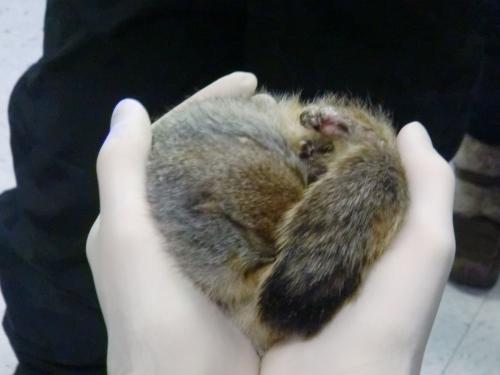 While hibernating, the squirrels curl into a little ball and cover their face with their tail.
While hibernating, the squirrels curl into a little ball and cover their face with their tail.
Why Do Scientists Study Squirrels?
Understanding how the squirrels do this is the subject of the research. Scientists use advanced genetic analysis to analyze which genes are regulated at different stages of hibernation. The results could have important biomedical implications for modeling cerebral ischemia (reduced blood flow to the brain), traumatic head injury and hypothermia.
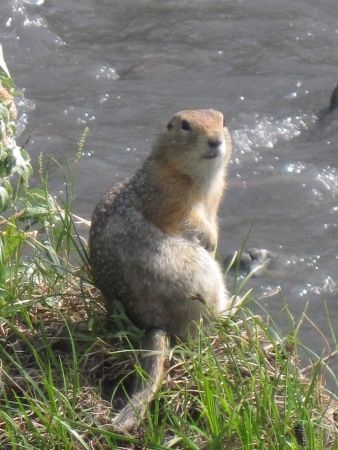 Arctic Ground Squirrel. Photo by Alicia Gillean (PolarTREC 2013), Courtesy of ARCUS
Arctic Ground Squirrel. Photo by Alicia Gillean (PolarTREC 2013), Courtesy of ARCUS
Now This Sounds Like Fun!
While at Toolik Field Station, Alicia and Andre help trap the ground squirrels and insert a "logger" in their abdomen. The logger is about the size of a fat dime and records the internal temperature of the squirrel. Inserting the logger takes a bit of mini squirrel surgery. Don't worry! The squirrel is anesthetized and doesn't feel a thing. Next, each squirrel is ear tagged for identification and then they are released back to the wild. Later the squirrels are trapped again so that the loggers can be recovered. The squirrels are stitched back up and let go. The scientists then read the data from the logger.
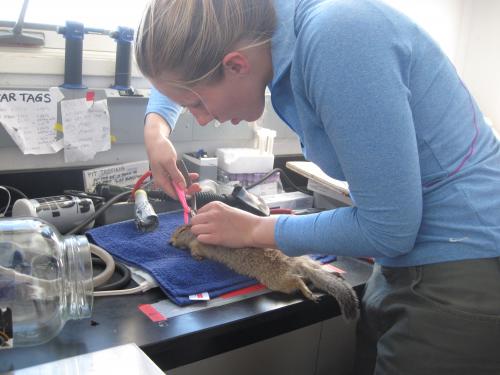 Kate Wilsterman attaches an ear tag to an anesthetized Arctic ground squirrel. Toolik Field Station, Alaska.Photo by Alicia Gillean (PolarTREC 2013), Courtesy of ARCUS
Kate Wilsterman attaches an ear tag to an anesthetized Arctic ground squirrel. Toolik Field Station, Alaska.Photo by Alicia Gillean (PolarTREC 2013), Courtesy of ARCUS
WHAT?!?!?
Now that's some pretty cool science! What questions do you have about arctic ground squirrels? Post them in the comments section and will I will try and find the answer. Or, check out this guy, Matsutaka Uchikoshi, who hibernated for three weeks after he went missing in a remote mountainous region of Japan:
http://usatoday30.usatoday.com/weather/news/2006-12-20-japan-hibernation_x.htm
What?!?
 Can humans hibernate? AFP/AFP/Getty Images
Can humans hibernate? AFP/AFP/Getty Images

Comments
Pagination